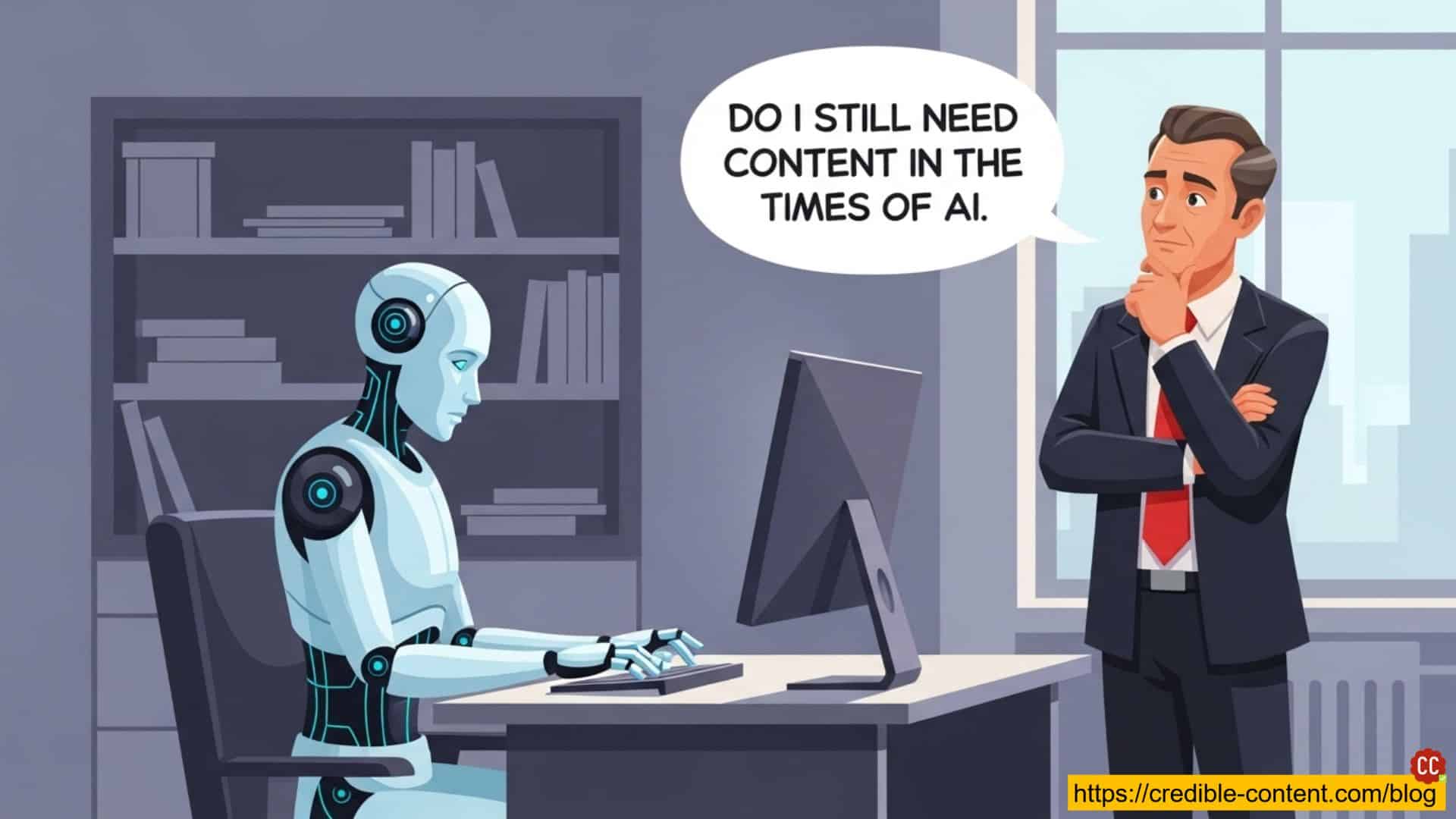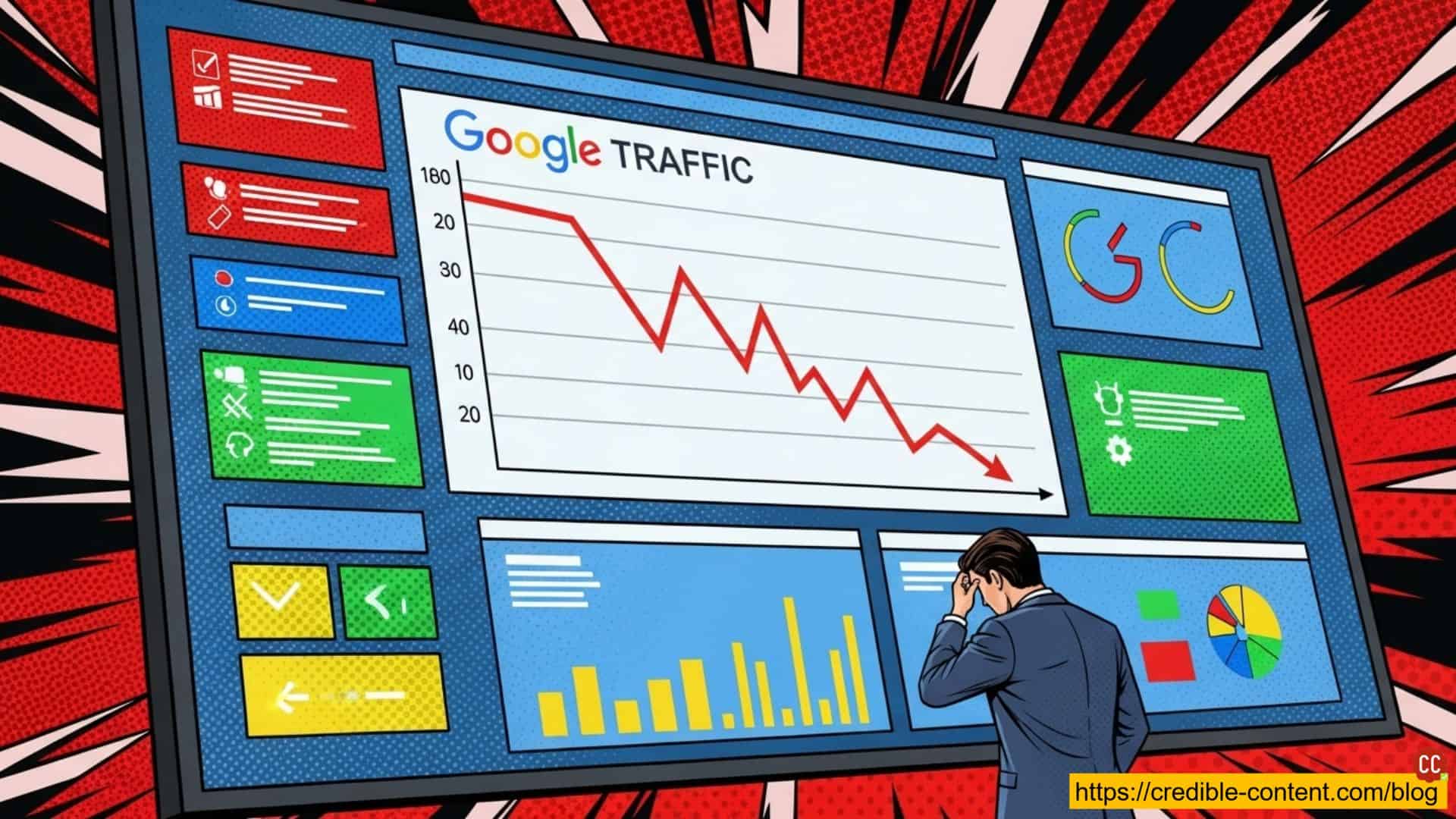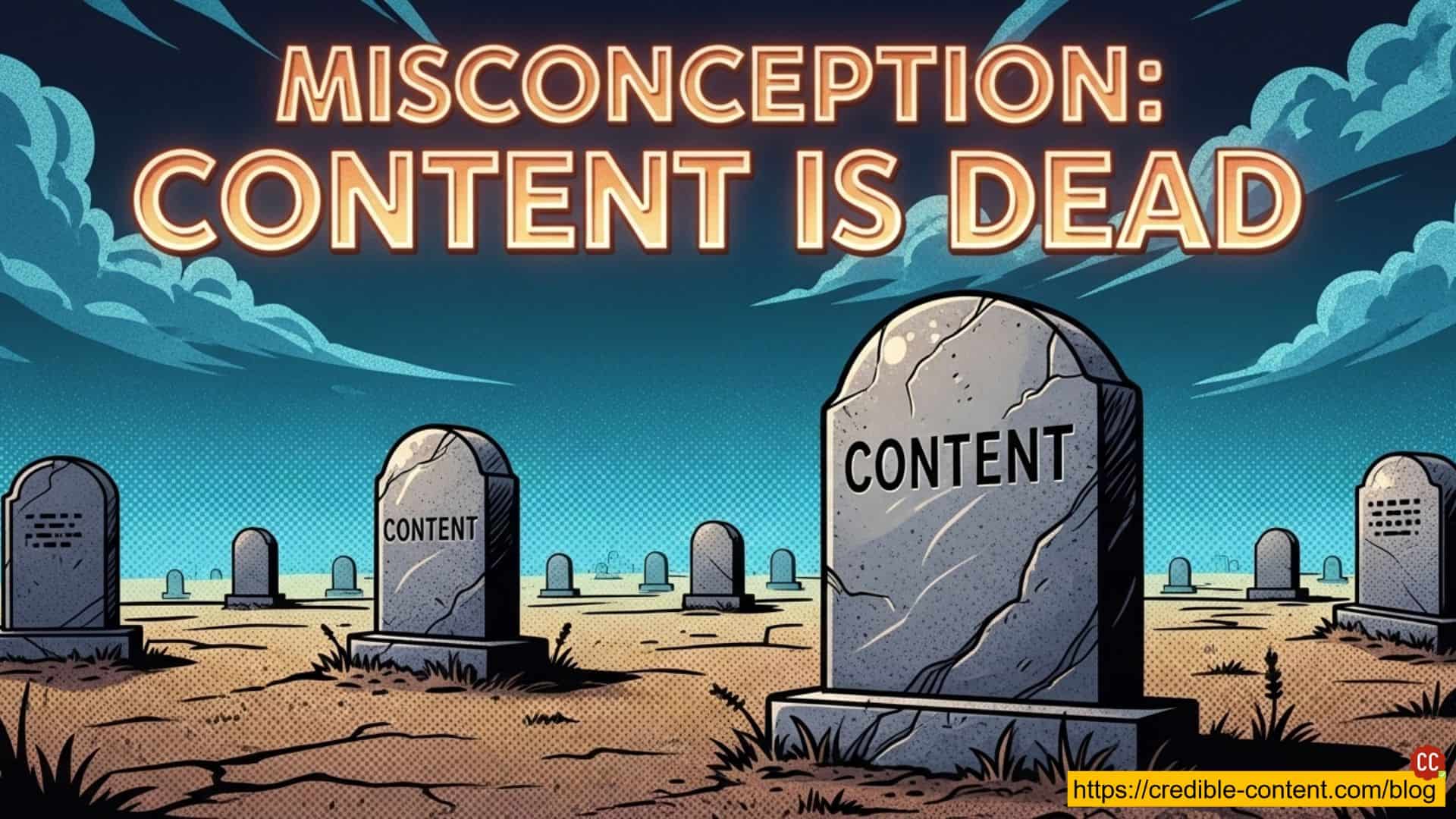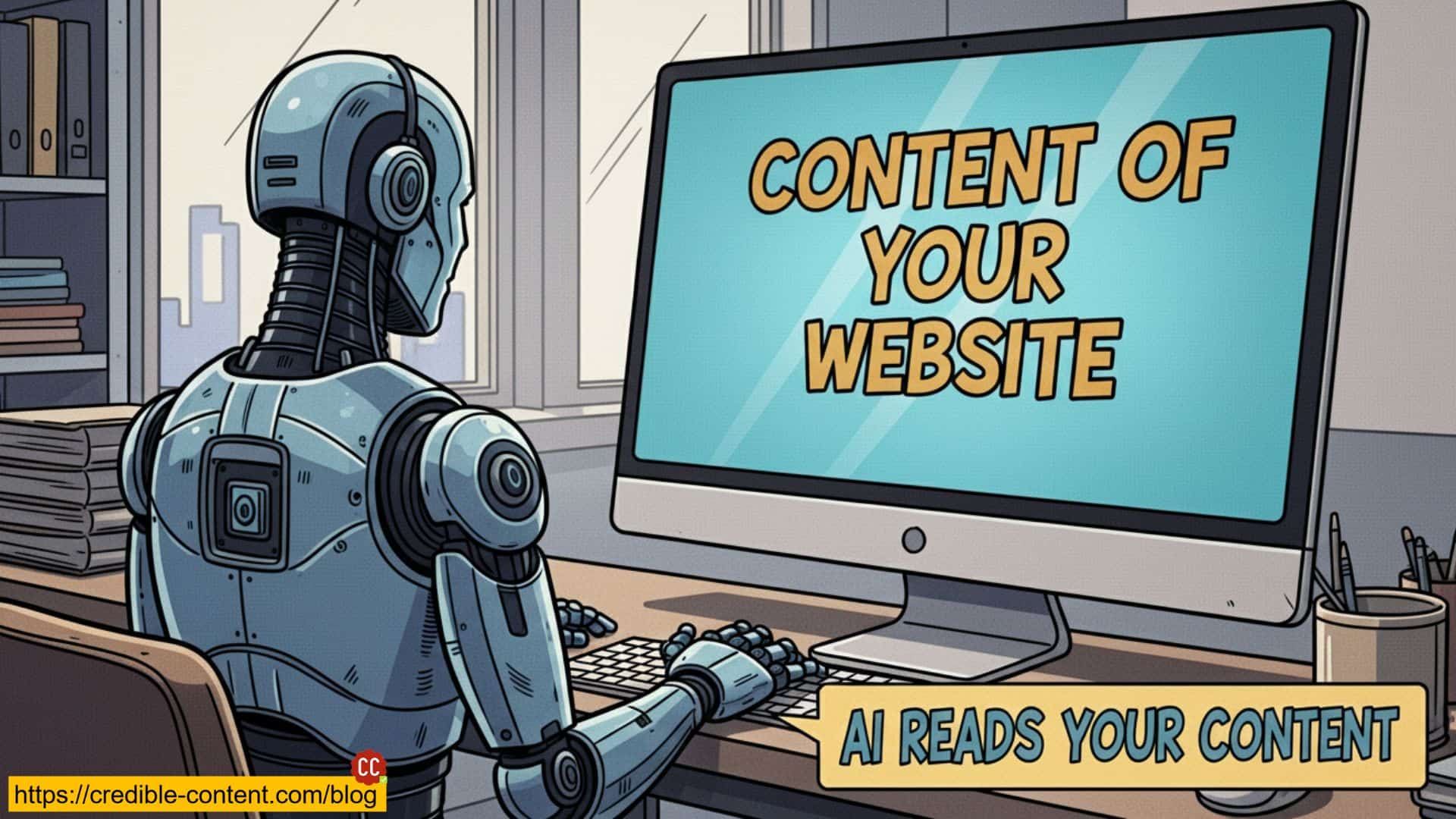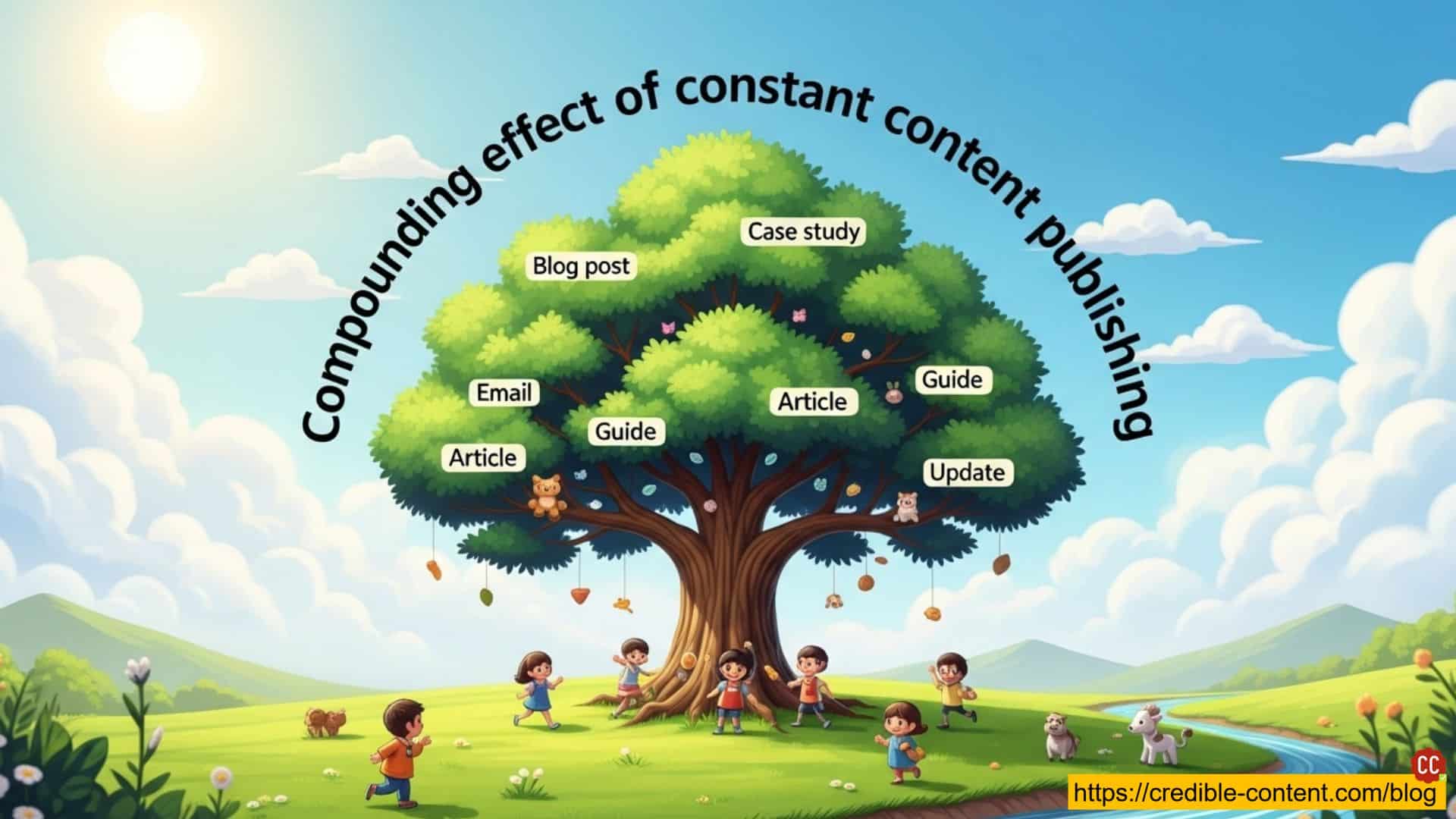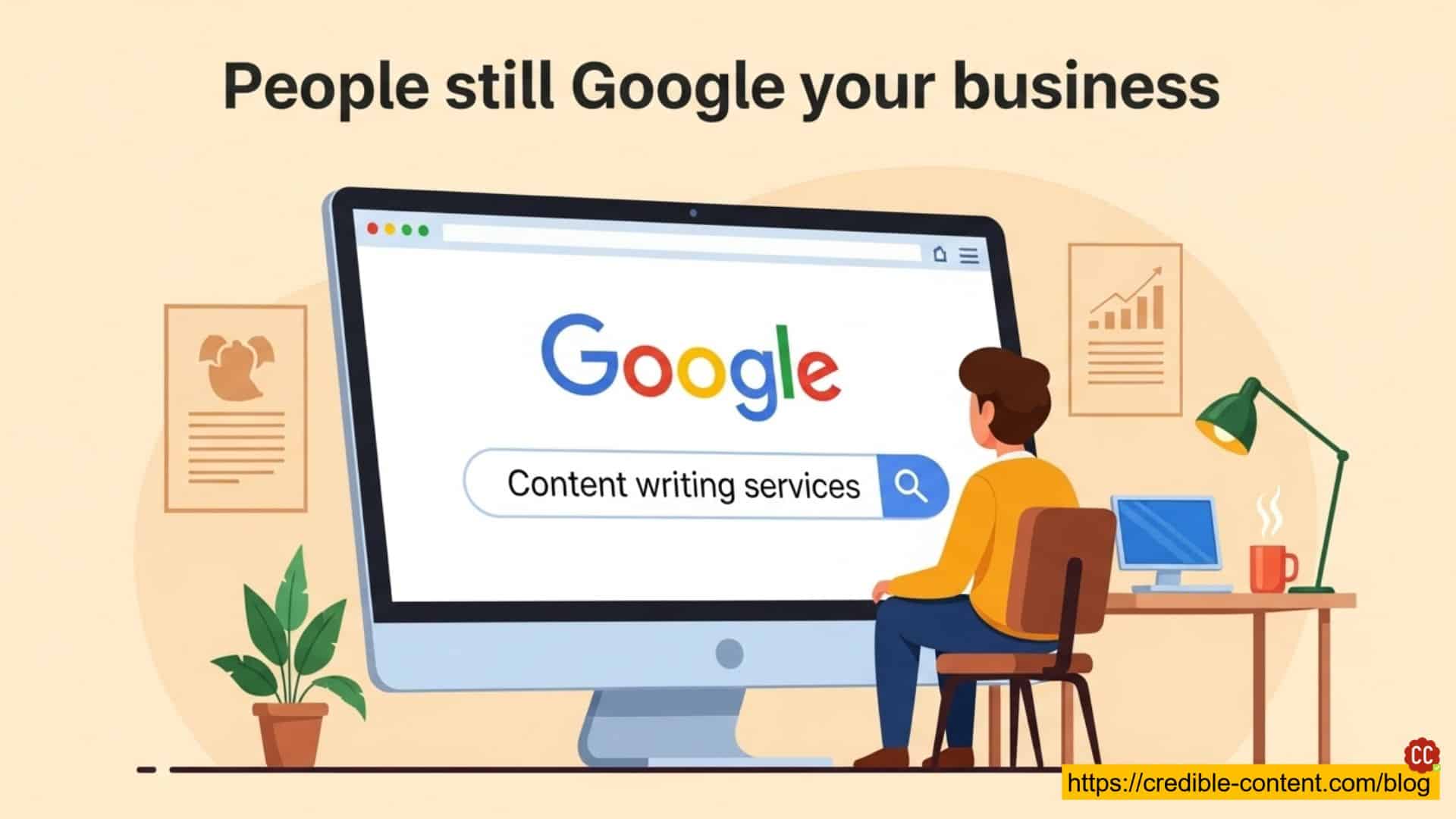Everywhere you look, people are screaming the same thing: “AI has killed content. There’s no point in writing blogs anymore.”
Business owners are panicking. You’ve probably heard it in your own circles. Maybe you’ve even thought it yourself. Google traffic is going down. ChatGPT and Perplexity are answering everything directly. And if users don’t even need to click on websites, why bother spending money or time on content?
It sounds logical. But it’s wrong. Dead wrong.
Here’s the reality: if you stop writing and publishing, you don’t just lose clicks – you lose your voice. You lose visibility. You vanish from the very ecosystem that AI depends on to give answers.
Yes, it’s true. Traffic from Google search has dropped. Studies show organic website traffic losses range anywhere from 1% to 25%. Publishers and media houses have taken the biggest hit, with some reporting drops as steep as 50%.
Google’s AI Overviews have cut click-through rates by 15% to 34.5% for many top-ranking links. And around 60% of searches now end in “zero-clicks.” Users don’t need to leave the results page. They get what they need right there.
On the surface, these numbers sound like a death sentence. Do you know what the good thing is? People are still looking. They’re still searching. They’re still evaluating. They’re still choosing who to trust, who to work with, who to buy from.
And where do AI tools like ChatGPT and Perplexity get their information from? Not from thin air. Not from some magic well of infinite knowledge. They get it from websites like yours. From blogs. From case studies. From product pages. From the content you publish.
So let’s cut through the noise. Blogging and publishing are not outdated. They’re not optional. They’re not “something we used to do before AI took over.” They’re the foundation of how your business is found, trusted, and remembered – by Google, by AI tools, and most importantly, by your customers.
Think about it this way. Imagine you run a coaching business. If you stop writing, what happens when a potential client searches for “business coach for leadership teams”? ChatGPT will not suddenly invent your name. It will recommend the coaches who are actively publishing content – the ones feeding the machine with fresh knowledge. If you’re not publishing, you’re invisible. Period.
That’s why this panic around AI replacing content is dangerous. It’s lulling business owners into thinking they can just give up, stop publishing, and somehow still be found. That is not how it works. If you vanish from your own website, you vanish everywhere else.
The question isn’t “Does writing and publishing still matter in the time of AI?” The question is: “Can your business survive if you stop?”
The brutal numbers – yes, Google traffic is down
Let’s not sugarcoat it. The numbers are ugly. If you run a business and you’re staring at your analytics dashboard wondering why your website traffic is bleeding, you are not imagining things.
Studies confirm what many already fear: organic website traffic losses from Google search range from 1% to 25%. That’s the general average. But if you are in publishing or media, the drop is even steeper – some sites are reporting up to a 50% decline since late 2024. Why? Because Google rolled out AI Overviews, and users no longer need to click to get answers.
Here’s another painful truth: for many keywords, Google’s AI Overviews have reduced click-through rates by 15% to 34.5%. Imagine you’re ranking number one on Google, you worked for years to get there, you invested in SEO, backlinks, content. And then overnight, you see your clicks cut by a third, not because your ranking dropped, but because the AI box at the top handed out the answer before anyone could even see your link.
And it doesn’t stop there. Roughly 60% of Google searches now result in zero-clicks. That means six out of ten times, the user never leaves the search page. They find their answer right there, served by AI. For news publishers, the hit has been brutal – a 7% median year-on-year decline in traffic. For non-news brands, the decline is even worse at 14%.
If you’re a business owner, you might be thinking, “Well, that’s it. Why waste money on content if Google won’t send me the clicks?” That’s the wrong conclusion.
Look closely at the numbers. While ChatGPT and Perplexity are rising, they are still not replacing Google. ChatGPT’s share of global search volume is just 0.21% as of August 2025. Google still commands 41% of global web traffic. The gap is massive. Yes, it is closing incrementally, but Google is still the king.
What these numbers actually tell you is this: the landscape is shifting, but the game is still on. People are searching differently, but they are still searching. Traffic patterns are changing, but they are not disappearing.
And here’s the kicker – whether people search on Google, ChatGPT, or Perplexity, the answers still come from content published on websites. If you stop publishing, you take yourself out of the pool completely. You are not just losing clicks, you are erasing your business from the very sources that power AI answers.
The brutal numbers don’t mean you stop publishing. They mean you have to be smarter. Smarter about the topics you choose. Smarter about the intent behind the keywords. Smarter about how you position your content so it feeds both Google and AI tools.
So yes, the numbers are brutal. But the bigger truth is this: only those who keep publishing will continue to exist in this new search ecosystem. Stop now, and you’ll be history.
The misconception – AI gives answers, so content is dead
This is the myth that is destroying businesses right now. Owners look at the stats, see their traffic dipping, and jump to a lazy conclusion: “AI is giving the answers, so there’s no point in publishing content anymore.”
Wrong. Completely wrong.
AI does not pull answers out of thin air. ChatGPT, Perplexity, Google’s AI Overviews – all of them need something to chew on. And what do they chew on? Your content. My content. The millions of pages, blogs, guides, and articles published on the web.
If businesses stop publishing, the system collapses. AI is like a parrot. It repeats what it finds. If there’s nothing fresh, it regurgitates stale, outdated information. That should scare you more than any drop in Google traffic.
But here’s where the misconception gets dangerous. Many business owners convince themselves that since AI is answering questions, their website doesn’t matter anymore. That’s business suicide. Because when ChatGPT suggests a product, a service, or an expert, it’s not creating one out of thin air. It is recommending based on what’s published online.
Think about it. If you run a coaching business and someone asks ChatGPT, “Who are the top business coaches for leadership?” The AI doesn’t invent new names. It picks from what’s available on the web. If your website is silent, if your blog is dead, if your content stopped in 2022, do you think you’ll show up? Not a chance.
The same goes for any industry. A small accounting firm. A boutique jewelry store. A legal consultant. If you stop publishing, you stop feeding the machine. And if you’re not feeding it, your competitors are. Guess who gets recommended? Not you.
So, let’s kill this misconception right now. AI is not a replacement for your content. It is a distributor of your content. It doesn’t generate credibility, it amplifies credibility. And credibility only exists if you have something published that proves you’re worth trusting.
Here’s the blunt truth: stop writing and you don’t just lose Google clicks – you lose your existence in AI results. You lose your chance to be considered at all.
So the next time someone tells you, “AI has made publishing content useless,” ask them one simple question: “Where do you think AI gets its answers from?” The silence that follows will tell you everything.
Why AI still depends on your content
The part most business owners completely miss is that AI tools are not independent thinkers. They are not inventors. They are scavengers. They roam the web, gather what’s already out there, and serve it back in a neatly packaged answer.
If your content is missing, you are invisible. Simple as that.
ChatGPT does not have a secret database of businesses. Perplexity does not magically know which accountant in your city is trustworthy. Google’s AI Overviews don’t make up expert advice. They all depend on what has been published – the articles, the blogs, the guides, the FAQs, the case studies, the testimonials, the thought pieces.
If you stop publishing, you stop showing up. Period.
Take a simple example. Suppose you run a web design business. A prospect asks ChatGPT, “What are the best small business web design companies in my area?” What happens next? ChatGPT scans its sources. It looks at recent blogs on web design, case studies of client projects, comparison articles, and testimonials. If you’ve been publishing consistently, your content becomes part of that dataset. You have a chance of being recommended. If you’ve been silent, your competitor who has been publishing becomes the name that shows up. You’re gone before the conversation even starts.
And this doesn’t just apply to web design. It applies to every business. A lawyer. A fitness trainer. A jewelry retailer. An architect. If you don’t publish, AI has nothing to latch onto. And if AI has nothing from you, it will latch onto your competitor instead.
This is why “waiting it out” is the worst possible strategy. Some business owners think, “Let’s just pause content for a while. Let’s see how AI changes things.” That’s not how it works. AI doesn’t wait. It feeds on what’s fresh. Every month you stay silent, your competitors are building a stronger and stronger presence in the dataset. By the time you wake up, you’ll be so far behind you may never catch up.
AI tools aren’t just pulling data. They are prioritizing authority. If multiple businesses have similar offerings, who gets mentioned? The one that looks most credible. And how do you look credible? By publishing. By staying visible. By proving, through your content, that you know what you’re talking about.
So the next time you feel like content doesn’t matter anymore, remember this: AI is hungry. It needs fresh, high-quality information every single day. If you’re not feeding it, someone else is.
AI depends on your content. Without it, you don’t exist in its world. And if you don’t exist there, you don’t exist in the minds of your customers either.
Beyond traffic – the authority factor
Too many business owners obsess over clicks. They think content is only about getting traffic from Google. So when that traffic dips, they panic.
But content is not just about traffic. It’s about authority. It’s about credibility. It’s about showing the world that you’re not just another random business floating on the Internet.
Think of it this way. A customer lands on your website. Maybe they came from Google. Maybe they typed your name directly. Maybe they clicked on a link someone shared. What do they see?
If your site looks alive – recent blogs, updated resources, case studies, answers to common questions – you instantly look like an authority. You look like someone who knows what they’re doing. On the other hand, if your last update was in 2022, what does that say? It screams neglect. It tells the visitor you’re outdated, maybe even unreliable.
Would you trust a lawyer whose website hasn’t been updated in three years? Would you hire a marketing consultant who has nothing recent to say about AI and search? Would you buy jewelry from an online store whose last blog post is about a fashion trend that died in 2021?
Exactly. You wouldn’t.
This is where publishing proves its worth. It’s not about whether you rank number one for a keyword. It’s about what impression you leave when people check you out. And make no mistake, people will check you out. Before hiring you. Before buying from you. Before trusting you with their money.
Here’s another truth most business owners ignore: AI doesn’t replace trust. Even if someone finds you through ChatGPT or Perplexity, they’re still going to visit your website before making a decision. And when they do, what will they find? An active, updated presence that inspires confidence, or a ghost town of stale content that makes you look like you don’t care?
This is why publishing regularly is a trust-building activity. It’s not just for search engines. It’s for human beings who want proof. Proof that you’re real. Proof that you’re active. Proof that you’re invested in your work.
When your content consistently answers questions, addresses problems, and shares insights, you’re not just chasing traffic, you’re building authority. You’re positioning yourself as the go-to business in your space. Of course you know that in competitive markets, authority is the only thing that separates winners from the ones nobody remembers.
So stop thinking of publishing as just a numbers game. Traffic goes up and down. Algorithms change. AI tools rise. But authority – that stays. From Raiders authority come? Showing up, again and again, with fresh, relevant, valuable content.
That’s the real power of publishing.
The compound effect of consistent publishing
Content is not a one-time effort. It is not a campaign you run for three months and then forget about. Publishing works like compounding interest. The more you invest, the stronger your returns get over time.
Every blog post, every article, every resource you publish adds another layer to your online presence. One piece by itself may not change much. But fifty pieces? A hundred? Suddenly you have a body of work that dominates search results, feeds AI tools, and positions you as the authority in your space.
The effect is cumulative. One blog today does not just bring you traffic tomorrow. It keeps working for months, sometimes years. A guide you publish in 2025 could still be bringing you leads in 2027. And every new piece builds on the foundation you have already laid. That is the compounding effect.
Now think about the opposite. What happens when you stop publishing? It is like pulling money out of an investment account. You do not just stop growing – you start losing ground. Your competitors keep publishing, their authority compounds, and they pull further and further ahead. By the time you decide to restart, you are not just behind – you are invisible.
Example: Imagine two e-commerce businesses selling handmade jewelry. Business A keeps publishing blogs, buyer guides, customer stories, and FAQs. Business B stops publishing in 2023 because they believe AI has made content pointless. Fast forward to 2026. Business A shows up everywhere. Google still ranks their content. ChatGPT references their guides. Customers land on their site and see fresh updates. Business B? Forgotten. Their traffic has dried up, their authority has vanished, and they are scrambling to catch up.
That is the power of consistency.
Another overlooked truth: AI tools reward freshness. They are trained to prioritize updated, relevant content. If you are publishing regularly, your material keeps entering the cycle. If you stop, your voice fades out of the dataset. Consistency is not just about SEO anymore – it is about staying visible to AI itself.
The compounding effect does not just work for visibility. It works for credibility too. The more you publish, the more touchpoints you create for potential customers. A prospect might not hire you after reading one blog. But after reading five, ten, fifteen pieces over a few months, now they trust you. Now they remember you. Now they are ready to buy.
This is why consistent publishing separates serious businesses from amateurs. Anyone can publish a blog once in a while. But the businesses that dominate are the ones that show up again and again, month after month, year after year.
So do not think of publishing as an expense. Think of it as an asset that grows with time. Stop investing, and you lose the compounding effect. Keep going, and the returns only get stronger.
That is how content works – not in bursts, but in momentum.
The practical reality – AI or no AI, businesses still Google you
Let us get real for a moment. Even with all the hype around ChatGPT and Perplexity, people still Google you. They still type your business name. They still type “best [your service] near me.” They still check websites before they make a decision.
AI can answer a lot of questions, but it cannot replace the instinct people have to verify. If someone is about to hire a web design agency, a business consultant, or an accountant, they will not just take ChatGPT’s word for it. They will Google the business. They will click on the website. They will scan through the content to see if the business looks alive and credible.
You know what? If your website looks empty, outdated, or abandoned, people will move on. They will not trust you. They will not take a risk. They will pick the business that looks active, engaged, and trustworthy.
I see this mistake all the time. Business owners assume that since AI is doing the talking, their website does not matter anymore. But when a customer is ready to buy, they do not just read an AI summary. They look for proof. Proof that you know what you are doing. Proof that you are not some faceless operation. Proof that you are real.
What gives them that proof? Your published content.
Fresh blogs. Detailed guides. Case studies. Testimonials. Service pages that explain your process. FAQs that address customer worries. All of this builds trust. All of this tells the customer that you are not just present, but reliable.
Take a simple example. Imagine two accounting firms. One has been publishing consistently. They put out articles about tax updates, guides for small business compliance, insights on financial planning. The other firm stopped updating their site in 2021. Both might get mentioned in AI summaries. But when the prospect Googles them and lands on their websites, which one earns trust? The firm that looks alive, or the firm that looks abandoned?
The choice is obvious.
This is the practical reality of business in the age of AI. People still Google you. They still visit your website. They still judge you based on what they see there. If you do not publish, you fail that test before you even get a chance to speak to the customer.
So stop fooling yourself into thinking AI has replaced your need to publish. AI can amplify your presence, but only if you have a presence worth amplifying. Without content, you are nothing more than a name on a list. And customers do not spend money on names. They spend money on authority and trust.
Authority and trust come from regular content publishing.
My advice as a content marketing expert
I have been watching these trends closely. I read the studies. I track the numbers. I see how AI is changing search. But I also see how business owners are reacting. Too many are jumping to the wrong conclusion. They believe publishing has lost its value. They think AI will do the heavy lifting for them. That is a mistake.
Here is my advice, straight and simple. Stop obsessing about traffic charts. Yes, the numbers are shifting. Yes, click-through rates are lower. Yes, AI tools answer more questions directly. None of that changes the fact that your content is still your biggest asset.
Content is what keeps you visible. It is what builds trust. It is what customers see when they check you out. Whether someone discovers you through Google, ChatGPT, or a referral link, they will eventually land on your website. If the content looks alive, you win their attention. If the site looks abandoned, you lose them. It is that simple.
Do not treat publishing as an optional task you can drop when the market gets tough. Treat it as the foundation of your marketing. Think of it the way you think about electricity for your office or internet for your team. Without it, nothing else works.
What does this mean in practice?
- Keep publishing consistently. Even if traffic dips, stay visible.
- Write for humans first. Share stories, insights, case studies. Numbers matter, but trust matters more.
- Use content to answer the questions your prospects are already asking. If you are a web design company, publish about design mistakes to avoid, trends for small businesses, or case studies of successful projects. If you are a consultant, share lessons from your clients, frameworks that work, and problems you solve every day.
- Focus on quality and intent. AI feeds on what you publish. If your content is generic, you blend in. If your content has depth, you stand out.
I know many owners are tired. They feel like they have been writing blogs for years with no clear payoff. But here is the truth: you are not writing for yesterday’s internet, you are writing for tomorrow’s. Google is shifting. AI is rising. Customers are searching differently. The only way to stay in the game is to keep publishing.
So my advice is not complicated. Keep going. Do not slow down. Do not wait it out. Do not assume AI will somehow make you visible without effort. The businesses that survive this shift will be the ones that stay consistent, keep publishing, and keep feeding both search engines and AI systems with content that proves they matter.
Stop now, and you erase yourself. Keep publishing, and you stay in control.
Conclusion – does content still matter? Absolutely
So let us go back to the original question. Does writing and publishing content still matter in the time of AI? The answer is not complicated. Yes, it matters. It matters as much as it did ten years ago, maybe even more.
Traffic patterns have changed. Click-through rates are lower. Google’s AI Overviews keep many users on the search page. ChatGPT and Perplexity answer questions directly. On the surface, this feels like a death sentence for content. But look deeper. Where do those AI tools get their answers? They get them from websites like yours. They need fresh content to stay relevant. Without it, they have nothing to say.
This is the part many business owners miss. AI does not invent authority. It reflects authority. If you publish regularly, you feed the ecosystem that makes you visible. If you stop, you erase yourself from that system.
Think about your own behavior. Before you buy, you still Google the product. Before you hire someone, you still check their website. Before you spend money, you still want proof that the business is alive and trustworthy. That proof comes from content. Nothing else gives your prospects that confidence.
I will say it clearly. If you stop publishing, you disappear. Not just from Google, but from ChatGPT, from Perplexity, from every channel where your customers are searching. You vanish from the conversation.
On the other hand, if you keep publishing, you remain present. You remain visible. You remain credible. Your blogs, your guides, your case studies, your updates all add up. They work like compound interest. They keep building your authority day after day. Even if traffic dips, even if AI shifts things around, your presence stays strong because you never stopped feeding the system.
So what should you do? Write. Publish. Keep showing up. Treat content as the foundation of your business visibility. Do not wait for AI to stabilize. Do not wait for Google to stop experimenting. The businesses that win are the ones that stay active no matter how the landscape shifts.
The misconception that publishing has lost its value is dangerous. It is leading many businesses to pull back at the exact moment they should be doubling down. You cannot afford to join them.
Does writing and publishing content still matter in the time of AI? Absolutely. More than ever. The question is not whether it matters. The real question is whether your business can survive if you stop.

